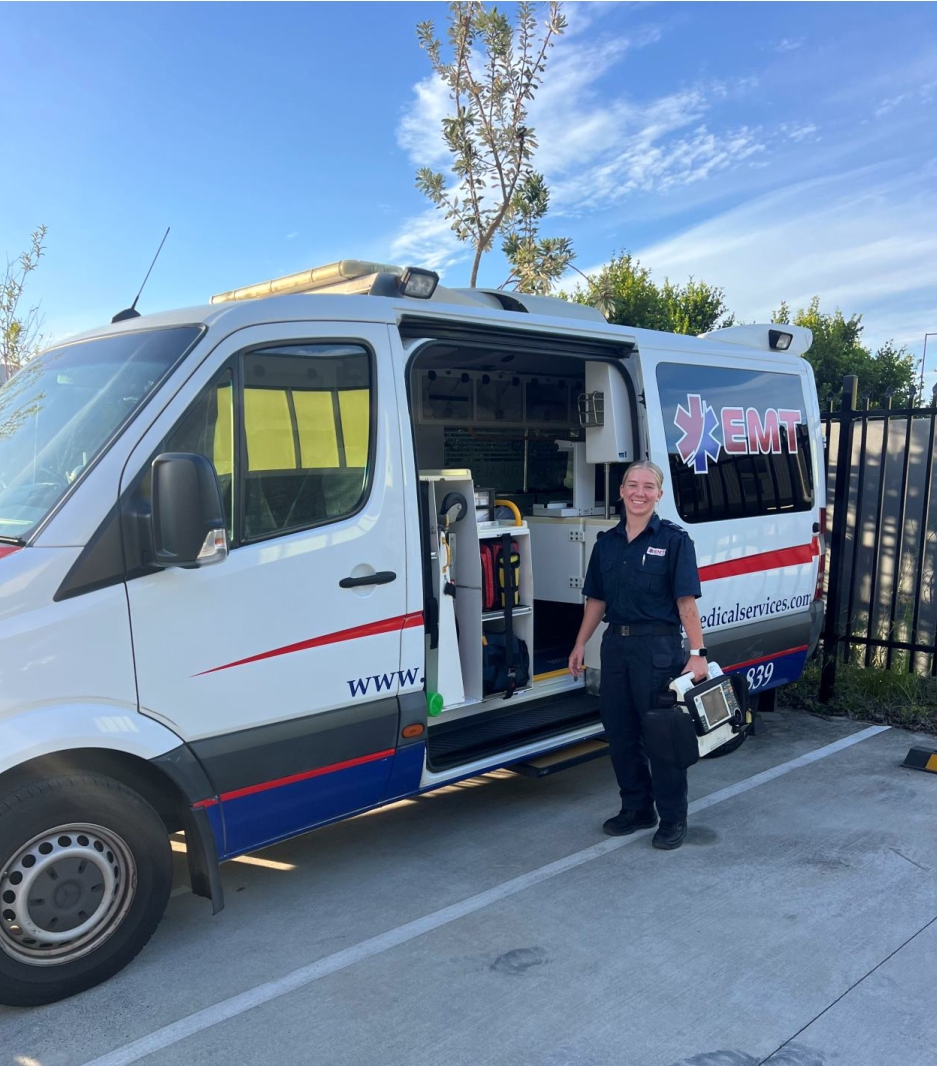
Sunshine Coast, Gubbi Gubbi Country
"When I go on a shift with a registered paramedic, it's a great opportunity to take advantage of their knowledge and learn from them"
For third-year University of the Sunshine Coast undergraduate Hayley McMaster, the opportunity to work as a student paramedic while studying has been one of personal and professional growth, building her clinical skills and boosting her confidence as a practicing clinician.
Since July 2024, Hayley has been working part-time for the Sunshine Coast-based EMT Medical Services, which has been employing paramedicine undergraduates for the past decade. For Managing Director Paul Will, it’s a win-win situation for both his service and for the students themselves.
“The reason we did that was mainly because student paramedics only get limited time on road,” he said. They do have a set of skills, even though they're not qualified, and we identified pretty quickly that it would be beneficial for everybody concerned. It gives them more clinical experience and allows them to expand their clinical knowledge.”
At present, EMT Medical Services employs 28 people, a number of whom are undergraduates. It is a multifaceted organisation with five ambulances that are equipped to ALS standard. In addition to medical transports, it also provides aeromedical services within Queensland, interstate and internationally, and events medical services.
Paul said the students were involved in both medical transport and events. The service is contracted to pick up patients from two private hospitals, one in Brisbane and one on the Sunshine Coast. Unlike the drop-off transfers common to jurisdictional ambulance services, EMT Medical Services provides a whole-of-journey approach.
“Each of those transfers has a paramedic or nurse on board, depending on the patient’s condition. We take over care of the patient while they're having imaging done, PET scans, MRIs, CTs, PICC line insertion, that sort of thing. We wait for them during that appointment and then we take them back to their hospital, and that's all done in a timely manner, which is beneficial for the patient.
“It's also beneficial for the hospital because they were sending their own nursing staff off the ward, then leaving the nurse there and coming back maybe six hours later to pick the patient up and take them back, so we’ve cut the time down by at least half. The patient is well looked after the whole time and it works very well for everybody.”
Events medical can involve high-capacity, high-risk motorsports or smaller community gatherings. Depending on the nature and size of the event, and if the event organisers stipulate that both a paramedic and a student paramedic/medic are required, students will either go alone or in tandem with a registered paramedic.
Hayley, who has primarily engaged in medical transports as well attending wine festivals and speedways, said the experience and confidence she was gaining was proving to be invaluable, and provided her with additional clinical experience beyond the mandated placements all paramedicine students must undertake.
“I really like being on road and having that sort of patient interaction, and I think being an EMT is a great opportunity to be able to interact with patients and to improve a systematic approach to different jobs and scenarios,” she said. “When I go on a shift on with a registered paramedic, it's a great opportunity to take advantage of their knowledge and learn from them, as well as get advice and feedback on areas you can improve.”
Hospital transfers also enable Hayley to hone her communication skills in building trust, rapport and connections with patients, particularly with those who are more vulnerable, and in the process bolstering her level of confidence as a clinician.
“Confidence definitely was a big thing for me and, to be honest, my confidence still isn't 100% there, but I definitely think that working in this environment has improved it a lot. And it's an absolute privilege to be there for someone in their most vulnerable time and to be let into their homes or to be allowed near them with almost immediate trust.”
EMT Medical Services typically employs students who have completed their first year of study. They operate to a specific scope of practice and, under certain conditions and in accordance with organisational requirements, can administer some drugs. In order to do so, they must be certified by a registered training organisation as per Queensland Health requirements, which is funded by the service itself.
“We put people through that course at our cost,” Paul said. “Hayley also did a sports taping course last year, so when she attends certain events that require that, she's got the qualification for it. Hayley has grabbed the opportunity with both hands and understands that this is going to enhance her learning. What she learns at uni, she can put into place with us.
“It’s a great opportunity for anybody who wants to do paramedicine, who wants to enhance their learning, because that's essentially what it is.”

Get unlimited access to hundreds of ACP's top courses for your professional development.
Join Now